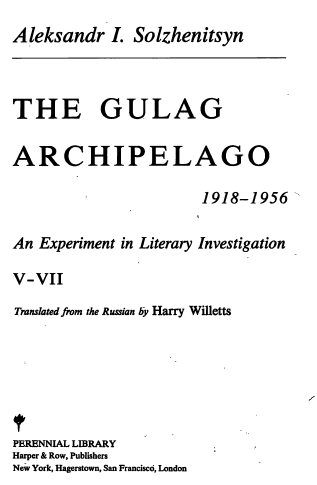 [---]
[---]The GULAG Archipelago
An Experiment in Literary Investigation
[justify]For years I have with reluctant heart withheld from publication this already completed book : my obligation to those still living outweighed my obligation to the dead. But now that State Security has seized the book anyway, I have no alternative but to publish it immediately.[/justify]
The Author
[---]
Aleksandr Solzhenitsyn - Gulag Archipelago.pdf
http://www.balderexlibris.com/index.php ... rchipelago
[---]
The GULAG Archipelago
1918-1956
An Experiment in Literary Investigation
By
Aleksandr I. Solzhenitsyn
[justify]It is a question if any work of literature in our era other than 'the Divine Comedy is commensurate with The Gulag Archipelago in structure, scale, multiplicity of incident and characters, emotional range, variety of inflection and, above all, in the staggering magnitude of its underlying concept.
In this masterpiece, the author of One Day in the Life of Ivan Denisovich and The First Circle has orchestrated thousands of incidents and individual histories into one narrative of unflagging power and momentum. Written in a tone that encompasses Olympian wrath, bitter calm, savage irony and sheer comedy, it combines history, autobiography, documentary and political analysis as it examines in its totality the Soviet apparatus of repression from its inception following the October Revolution of 1917.
The "Archipelago" of Mr. Solzhenitsyn's work is the network of secret police installations, camps, prisons, transit centers, communications facilities, transportation systems and espionage organizations which, in his view, honeycombs the length and breadth of the Soviet Union.
Drawing on his own experience, material from Soviet archives, cases collected during his eleven years of labor camps and exile, and the evidence of more than 200 fellow prisoners, Mr. Solzhenitsyn concludes that the secret police are the vital element of the Soviet regime, and have been ever since its founding by Lenin.
Numerous studies of the Soviet system of control have been published in the West but until now nothing so complete, so carefully documented and assembled, and never before has a literary giant devoted his gifts of narrative and characterization to the enterprise. Solzhenitsyn has here created and peopled with brilliantly portrayed human beings a vast, overarching fresco of that state within a state which is the Gulag Archipelago.
Thomas P. Whitney, the translator, has also translated both One Day in the Life of Ivan Denisovich and The First Circle, and is a leading authority on Russian culture and the Soviet Union.[/justify]
[---]
[justify]The Gulag Archipelago Two
"...may well be Solzhenitsyn's most stunning achievement." ?Time
In "The Destructive-Labor Camps," the first part of this volume, we experience the terrible plight of the working prisoners, the cruelty and caprice of camp authorities, and the tragic fate of the women prisoners and the luckless children born to them.
This chronicle of inhumanity is made bearable by the vitality and emotional range of Solzhenitsyn's writing that make his work on the "Archipelago" of Soviet repression one of the extraordinary literary events of our age.
"The Soul and Barbed Wire," the second part of this volume, is a magnificent statement on the possibilities of purification and redemption through suffering.
It was at the threshold of the camps that the first volume of GULAG left us. GULAG TWO takes us inside them.[/justify]
[---]
[justify]"ARCHIPELAGO THREE ... is a book about people. The writer's soliloquy links together the separate tales of individual nobility and depravity, of bravery and ingenuity, and of despair and helplessness in the face of a hostile environment. We meet real men and women. Some of them have been corrupted, but others have never given up the struggle ... [The stories] reach out beyond Soviet reality and into the realm of universal human experience."
?Saturday Review
"Solzhenitsyn can and must proclaim that the automatism of oppression can be arrested, because he has seen it arrested or, at least, ground to temporary impotence . . . This is the testimony of the final volume of the trilogy, with its enthralling record of camp uprisings, of escapes, of defiance by individuals and groups of victims. ... In poignant closing chapters, he recalls his own resurrection from the house of the dead, his own reentry, at once agonizing and joyous, into the habitual daylight of more or less normal, licensed existence."[/justify]
[---]
[center]Solzhenitsyn Alexander - One Day in the Life of Ivan Denisovich
http://www.balderexlibris.com/index.php ... Denisovich
Soljenitsyne Alexandre - Deux siècles ensemble
http://www.histoireebook.com/index.php? ... s-ensemble
http://www.balderexlibris.com/index.php ... s-ensemble[/center]